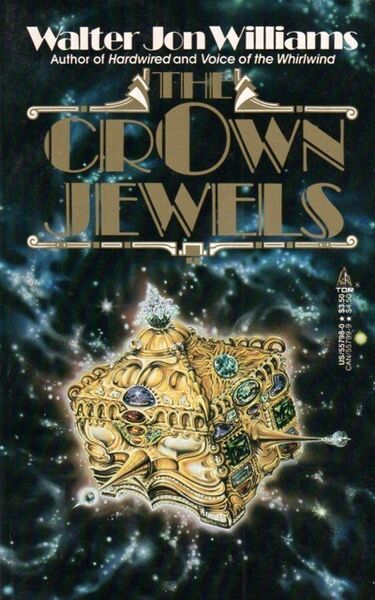Like A Thief
The Crown Jewels (Divertimenti, volume 1)
By Walter Jon Williams

27 May, 2025
The Crown Jewels is the first volume of Walter Jon Williams’ SF comedy-of-manners Drake Maijstral1 series (according to the ISFDB and various booksellers) or Williams’ Divertimenti (the collective name originally applied to this series). Guess which one I prefer?
Drake Maijstral is a respectable gentleman. Drake Maijstral is a known thief. How can those two facts be reconciled? Thank humanity’s conquerors, the Khosali.
Shortly after humanity developed space flight, one hundred thousand Khosali warships appeared in orbit. The ensuing war was short, the casualties surprisingly light2. Khosali High Culture replaced the indigenous human cultures as our gracious overlords did their best to civilize humanity.
Khosali revere the emperor. Khosali revere convention. Therefore, if an emperor does something that appears to be unconventional, that can only be an error of interpretation. Consequently, an emperor who might appear to the uninformed to be a kleptomaniac is nothing of the sort. That emperor must surely be an Allowed Thief, even if nobody has ever heard of such a thing before.
In the centuries since that first light-fingered emperor, the rules pertaining to Allowed Thieves were formalized. Allowed thieves are media stars, provided they follow the rules with sufficient panache. Drake is a highly successful (if cash-strapped) example.
Accompanied by his faithful but disapproving Khosalikh valet Roman, Drake accepts a commission from Amelia Jensen. Drake is to break into a certain mansion in Peleng City to pilfer an apparently inconsequential reliquary from amidst the vast trove of unremarkable militaria collected by Admiral Scholder, HCN, retired, before he became Admiral Scholder, HCN, deceased. In return for the reliquary, Jensen will pay Drake sixty novae.
For Drake to get his sixty novae, he needs to hand the reliquary to Jensen. How inconsiderate of Jensen to get herself kidnapped before the exchange can occur. Even more inconsiderate of the kidnappers to kidnap Drake’s client in the middle of a perfectly respectable criminal scheme. How can people be so terribly Non‑U?
Decades earlier, humanity surprised the Khosali by rebelling. They astonished the Khosali by winning their war of independence. The seemingly inconsequential reliquary is a souvenir of the uprising. Rather than being inconsequential, it is extremely consequential. It is the sort of treasure that legions of heavily-armed fanatics would kill to obtain.
More specifically, it is the sort of treasure that legions of heavily-armed fanatics would kill Drake Maijstral to obtain.
~oOo~
Even old favourites can surprise. In this case, I remembered correctly that Panshin’s Villiers books were among the works that inspired Williams (according to a Williams essay linked below). I was not surprised to see Laumer’s Retief and Jack Williamson’s Giles Habibula listed alongside Villiers. However, I was a bit surprised when Williams mentioned Anderson’s van Rijn stories. Those stories have some mild comedic elements, but comedy isn’t really the point. I was astonished that Williams cites Poul Anderson’s Flandry. Flandry was, I thought, lugubriously depressed tragedy. Have I misread the Flandry books for four decades?
Long-time Williams fans will notice parallels between the Divertimenti and the much later Praxis books. In both series, humans are conquered by doctrinaire, humorless aliens who impose their values on us. How can one be comedic and the other serious? In part, because the violence inherent in the system is largely kept off-stage in the Divertimenti (except when it’s funny), whereas the Praxis books give the violence inherent in the system center stage. Remember that when I get to the Praxis books in about a year (give or take, depending on if I review WJW’s collections, shared world, and media tie-in books)3.
Fans and critics of imperialism will note the usual imperial foibles in play. The Khosali impose their values on us while appropriating certain elements of human arts and cultures without really understanding what they are filching. The empire is genuinely astonished that humans didn’t appreciate being conquered. Having thrown off their oppressors after centuries of occupation, the former colonies still retain many imperial values. This is why Drake, who lives in the Human Constellation, has a career dependent on Khosali conventions.
Unkind people have asserted that SF fans collectively lack a sense of humor. This is not true. As long as the author remembers to precede each joke with a small boy waving a red Impending Joke flag and follows those jokes with detailed explanations as to why they were funny, ideally with carefully labelled illustrations, the average SF reader will spot the joke three times out of ten.
Comedy of manners, alas, is less about jokes as such than it is about absurd situations involving characters for whom those situations are deadly serious. Flag waving boys and power-point presentations will be of little use.
Williams deploys a surprisingly complex cast of characters and involved plots in fewer pages than one would expect. While I appreciate such things, other readers might have found the complexity too demanding. It’s not all that surprising that the Divertimenti were not Williams’ most commercially successful books. In fact, they were among his least commercially successful books.
Pity, because I liked the series.
As is often his custom, Williams discusses the series’ genesis and lamentable fate here.
The Crown Jewels is available here (Smashwords), here (Barnes & Noble), and here (Kobo).
I did not find The Crown Jewels at Bookshop US, Bookshop UK, Chapters-Indigo, or at Words Worth Books.
1: Wait, how is “Maijstral” already in my spellcheck?
2: USA delenda… along with every other nation state.
3: Or to put it another way, the sting is taken out of Khosali relentlessly expansionist imperialist tendencies by the absurd extremes to which they take their beliefs, whereas the humor inherent in the extremes to which Praxis’ Shaa take their absurd beliefs is undermined by the fact the Shaa are relentlessly expansionist imperialists.
